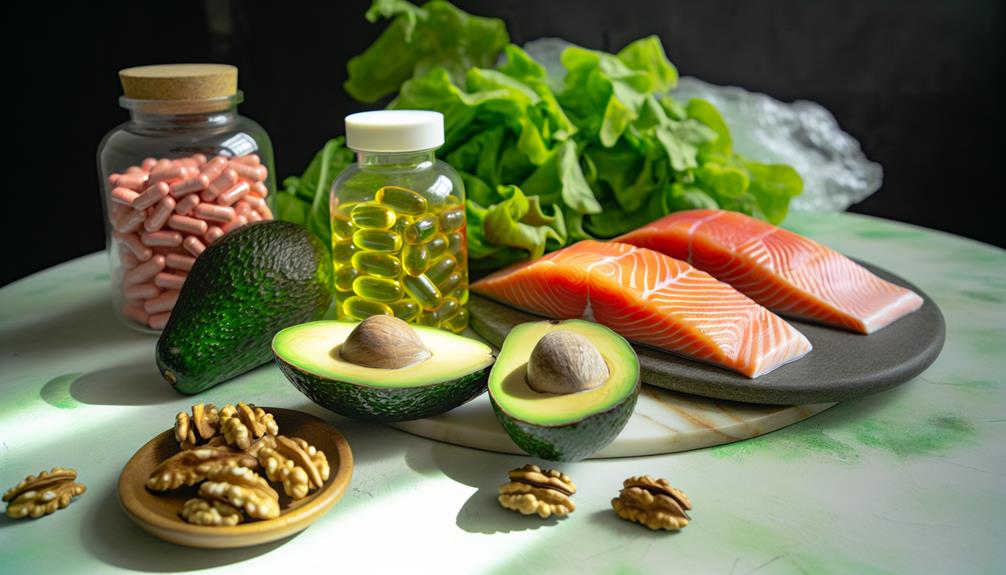To achieve hormonal balance, I've found that several vitamins are essential for men. To begin with, Vitamin D and Zinc are necessary for testosterone production. Vitamin B6 and B12 support energy levels and hormonal regulation. Vitamin E acts as an antioxidant while Folate is critical for DNA synthesis and mood stability. Vitamin C helps in reducing oxidative stress, and Vitamin K promotes hormone production. Omega-3 fatty acids are also significant for maintaining hormonal balance. Incorporating these vitamins can lead to improved well-being and mood. If you're curious to learn how to optimize these nutrients in your diet, there's more valuable insight ahead.
Vitamin D

Vitamin D plays an essential role in hormonal balance for men, acting like a key that releases various bodily functions. I've learned that its benefits extend far beyond just bone health; it's critical for maintaining testosterone levels. Research shows that adequate vitamin D levels can greatly influence hormone production, which is crucial for overall health and well-being.
When I think about vitamin D deficiency, it raises concerns. A lack of this essential nutrient can lead to low testosterone levels, fatigue, and even mood disorders. Studies suggest that men with lower vitamin D levels often experience increased body fat and reduced muscle strength, both of which can negatively impact hormonal balance. This deficiency isn't rare, especially in regions with limited sunlight exposure or among individuals with sedentary lifestyles.
To combat vitamin D deficiency, I've found that incorporating supplements or spending more time outdoors can make a considerable difference. Food sources like fatty fish, egg yolks, and fortified dairy products are also great options. Regularly monitoring vitamin D levels can help guarantee that I'm within the ideal range, promoting not just hormonal balance but overall health.
Vitamin B6
Pyridoxine, commonly known as vitamin B6, is a powerhouse when it comes to supporting hormonal balance in men. It plays an essential role in managing hormonal fluctuations and ensuring that our bodies function at their best. I've found that maintaining adequate levels of vitamin B6 can greatly influence mood, energy levels, and even testosterone production.
One of the fascinating aspects of vitamin B6 is its ability to interact with other vitamins, enhancing their effects. For instance, it works synergistically with magnesium and zinc, both of which are critical for hormonal health. Here's a quick overview of how vitamin B6 supports hormonal balance:
| Function | Hormonal Impact | Vitamin Interactions |
|---|---|---|
| Aids in hormone synthesis | Supports testosterone production | Works with zinc for optimal levels |
| Regulates mood | Mitigates stress-related hormonal changes | Enhances magnesium absorption |
| Boosts energy | Reduces fatigue linked to hormonal shifts | Interacts with other B vitamins |
Research indicates that a deficiency in vitamin B6 can lead to disruptions in hormonal balance, resulting in fatigue and mood swings. I recommend ensuring you get enough B6 through diet or supplementation if necessary. Foods rich in vitamin B6, like chicken, fish, and bananas, should be part of your routine. By paying attention to this essential nutrient and its interactions, you can take a proactive step towards achieving hormonal balance and overall well-being.
Vitamin B12

Vitamin B12 is essential for energy production, helping to convert food into fuel that keeps us active throughout the day. It also plays a significant role in the formation of red blood cells, which are vital for transporting oxygen in our bodies. Additionally, I've found that adequate levels of B12 can positively impact mood regulation, making it an important nutrient for overall hormonal balance.
Importance for Energy Production
When it comes to energy production, B12 plays an essential role that shouldn't be overlooked. This vitamin is imperative for energy metabolism, helping convert the food we eat into usable energy. If you've ever felt fatigued or sluggish, it might be due to a deficiency in B12, especially during periods of hormonal fluctuations.
Here's a quick overview of how B12 impacts energy production:
| Aspect | Importance |
|---|---|
| Energy Metabolism | Converts carbohydrates and fats into energy |
| Hormonal Balance | Supports adrenal function, aiding in stress response |
| Mood Regulation | Influences neurotransmitter production for better energy levels |
| Overall Well-being | Enhances liveliness and reduces fatigue |
Role in Red Blood Cells
Red blood cells are vital for transporting oxygen throughout the body, and B12 plays an important role in their production. I've learned that vitamin B12 is critical for the formation of red blood cells, as it helps in the synthesis of DNA during cell division. Without adequate B12, the body can't produce enough healthy red blood cells, leading to a condition known as megaloblastic anemia. This can result in fatigue and weakness, which can affect overall hormonal balance.
Moreover, B12's role extends beyond just red blood cell production. It also influences hormonal regulation effects, particularly in the context of testosterone levels. Studies suggest that low levels of B12 may contribute to hormonal imbalances, which can adversely affect mood, energy levels, and even libido. Ensuring you have enough B12 can help maintain ideal red blood cell levels and support overall hormonal health.
Incorporating foods rich in B12, such as meat, eggs, and dairy, or considering supplements, can be beneficial. So if you want to support your red blood cell production and hormonal balance, paying attention to your B12 intake is vital.
Impact on Mood Regulation
The connection between B12 and mood regulation is significant, as this vitamin plays a key role in maintaining overall mental health. I've noticed that adequate B12 levels can help combat mood swings and improve emotional stability. This vitamin is essential for the production of serotonin, the neurotransmitter responsible for regulating mood. When my B12 levels are ideal, I experience better stress reduction and anxiety relief, making it easier to navigate the ups and downs of daily life.
Research shows that low B12 can contribute to cognitive dysfunction and worsen feelings of anxiety and depression. When hormonal fluctuations occur, often seen in men as they age, maintaining B12 levels becomes even more vital. I find that a balanced intake of this vitamin not only supports my mood but also enhances my cognitive function, helping me stay sharp and focused.
Vitamin E
Vitamin E, with its powerful antioxidant properties, plays an essential role in maintaining hormonal balance in men. I've come to appreciate how this vitamin not only protects cells from oxidative stress but also influences hormone production, particularly testosterone. Research suggests that adequate levels of Vitamin E can enhance sperm quality and support reproductive health, which is imperative for many men.
One of the standout Vitamin E benefits is its ability to improve overall hormonal health. Studies have shown that men with higher Vitamin E intake often experience better testosterone levels. This is significant because testosterone is essential for everything from muscle mass to mood regulation. It's fascinating how something as simple as a vitamin can have such a profound impact on our bodies.
When it comes to Vitamin E sources, I've found that it's abundant in various foods. Nuts, seeds, and green leafy vegetables are excellent sources, with almonds and spinach being particularly rich. Cooking with oils such as sunflower or safflower can also boost your intake. For those who struggle to get enough from their diet, supplements are an option, but I always recommend consulting with a healthcare professional before starting any new regimen.
Incorporating Vitamin E into my diet has been a game-changer for my hormonal balance. It's a small step, but the benefits are significant, making it a vital element of a man's health strategy.
Vitamin C

As a powerful ally in achieving hormonal balance, Vitamin C is often overlooked in discussions about men's health. I've come to realize that this vitamin plays an important role not just in supporting the immune system but also in regulating various hormones. Research shows that Vitamin C can influence the production and function of hormones such as testosterone, which is critical for men's overall health and vitality.
One of the standout features of Vitamin C is its potent antioxidant properties. These properties help combat oxidative stress in the body, which can be detrimental to hormonal balance. When oxidative stress occurs, it can lead to inflammation and disrupt hormone levels. By incorporating Vitamin C into my diet, I've found that it aids in reducing this stress, promoting more stable hormone levels.
Furthermore, Vitamin C supports immune health, which is essential for maintaining a favorable hormonal environment. A strong immune system means fewer illnesses and lower stress on the body, factors that can greatly impact hormonal production. I often include Vitamin C-rich foods like oranges, strawberries, and bell peppers in my meals, ensuring I get enough of this essential nutrient.
Vitamin A
When I think about hormonal balance, Vitamin A stands out for its vital role in testosterone production. This vitamin not only supports hormone levels but also comes from various sources, including liver, fish, and leafy greens. Understanding how to incorporate these foods into our diet can help optimize our hormonal health.
Role in Testosterone Production
Testosterone production relies on several nutrients, and one of the key players is vitamin A. This essential vitamin plays a significant role in testosterone synthesis, directly influencing the hormonal regulation processes in the body. Research indicates that vitamin A is important for the function of Leydig cells, which are responsible for producing testosterone in the testes.
Without adequate levels of vitamin A, the synthesis of testosterone can be impaired, leading to low testosterone levels that may affect mood, energy, and overall health. Studies have shown that vitamin A deficiency can result in reduced testosterone production and subsequent hormonal imbalances.
Additionally, vitamin A helps maintain the health of the reproductive system, ensuring that hormonal pathways operate efficiently. It's intriguing to note that this vitamin also interacts with other hormones, further supporting the complex network of hormonal regulation.
Incorporating vitamin A into your diet can be a simple yet effective way to support testosterone production. By understanding its role, we can make informed decisions about our nutrition and overall well-being. So, keep an eye on your vitamin A intake—your testosterone levels might just thank you for it!
Sources of Vitamin A
Incorporating a variety of foods rich in vitamin A is vital for maintaining healthy hormone levels. I've found that there are two primary forms of vitamin A: preformed vitamin A, found in animal products, and provitamin A carotenoids, found in plant foods. For those looking to boost their intake, liver is one of the richest sources of preformed vitamin A, offering significant liver benefits, including improved metabolic function.
On the other hand, if you prefer plant-based options, consider incorporating carotenoid sources into your diet. Foods like sweet potatoes, carrots, spinach, and kale are excellent choices. These carotenoids convert to vitamin A in the body, supporting overall hormonal balance.
It's important to note that a balanced intake is key, as excessive vitamin A can lead to toxicity. As a result, focusing on a mix of these sources helps guarantee you're meeting your needs without going overboard. I recommend keeping a variety of these foods on hand, making it easier to maintain ideal vitamin A levels for hormonal health. By doing so, I've seen an improvement in my overall well-being and energy levels.
Vitamin K

Vitamin K plays an essential role in maintaining hormonal balance in men, particularly through its influence on the endocrine system. I've come to appreciate how this vitamin contributes to hormonal regulation, making it a significant component of overall health. The K vitamin benefits extend beyond blood clotting, as it also supports the synthesis of proteins necessary for various bodily functions, including hormone production.
Research indicates that Vitamin K helps regulate testosterone levels, which is crucial for maintaining muscle mass, energy levels, and sexual health. Insufficient levels of testosterone can lead to fatigue, decreased libido, and even mood changes. By ensuring adequate Vitamin K intake, men can potentially support their testosterone levels, which plays a significant role in their overall well-being.
Moreover, Vitamin K works synergistically with other vitamins and minerals, such as Vitamin D and calcium, to promote bone health and muscle function. Strong bones and muscles contribute to better physical performance and can indirectly influence hormone levels by reducing the risk of injuries and maintaining an active lifestyle.
Incorporating sources of Vitamin K into your diet is relatively easy. Leafy greens, such as spinach and kale, as well as fermented foods like natto, are excellent choices. Additionally, you might consider supplements if you find it challenging to get enough through food alone.
Folate
Folate is essential for maintaining hormonal balance in men, and I think many underestimate its importance. It's not just about preventing deficiencies; folate plays an important role in hormone regulation and overall health. Let's explore some excellent food sources of folate and the specific benefits it offers for hormonal function.
Importance of Folate
Many men overlook the essential role that folate plays in hormonal balance and overall health. Folate, a B-vitamin, is necessary for DNA synthesis and repair, which can greatly impact testosterone production and regulation. A folate deficiency can lead to various health issues, including fatigue, mood disorders, and, importantly, hormonal imbalances. When I learned about these links, it became clear that maintaining adequate levels of folate is vital for my well-being.
Research suggests that men with lower folate levels may experience reduced testosterone levels, which can affect everything from energy levels to libido. This makes folate supplementation an important consideration, especially for those who may not be getting enough through their diet. By incorporating folate-rich foods or supplements, I've noticed an improvement in my overall mood and energy, which directly correlates with my hormonal balance.
Incorporating folate into my daily routine has been a game-changer. Whether through dietary adjustments or supplementation, ensuring I have adequate folate levels has helped me maintain a healthier hormonal profile and overall well-being. It's something every man should consider for ideal health.
Folate Sources and Benefits
A diverse range of foods can help boost your folate levels, which is crucial for hormonal balance. Leafy greens, such as spinach, kale, and romaine lettuce, are excellent dietary sources of folate. Incorporating these into your meals can greatly enhance your intake. Additionally, legumes like lentils and chickpeas are potent sources, offering a hearty dose of this essential nutrient.
If you're looking for convenience, fortified cereals provide an easy way to increase your folate levels. Many breakfast cereals are enriched with folic acid, the synthetic form of folate, making it simple to meet your daily requirements. However, it's important to read labels to verify you're selecting options with adequate folate content.
For those who may struggle to get enough folate from food alone, nutritional supplements can be a helpful addition. Always consult a healthcare professional before starting any supplementation, as they can guide you on the appropriate dosage.
Folate's Role in Hormones
Incorporating folate into your diet can considerably impact hormone regulation. This B-vitamin plays an important role in maintaining healthy levels of homocysteine, an amino acid linked to testosterone production and overall hormonal balance. When I think about folate deficiency, I realize it can lead to disruptions in hormonal regulation, which might affect mood and energy levels.
Here are a few key points about folate's role in hormones:
- Supports testosterone production: Adequate folate levels can enhance testosterone synthesis, which is essential for muscle mass and libido.
- Reduces homocysteine levels: By keeping homocysteine in check, folate helps prevent potential hormonal imbalances that may arise from elevated levels.
- Aids in overall health: Folate contributes to the production of neurotransmitters, which can influence mood and stress levels, further impacting hormonal health.
If you're looking to optimize your hormonal balance, ensuring sufficient folate intake is necessary. This can easily be achieved through a balanced diet rich in leafy greens, legumes, and fortified foods. Remember, addressing folate deficiency could be a game-changer for your hormonal well-being.
Omega-3 Fatty Acids

Omega-3 fatty acids play an indispensable role in maintaining hormonal balance, especially for men looking to optimize their health. These polyunsaturated fats have been shown to support testosterone levels, enhance mood stability, and improve overall metabolic function. When I first learned about the omega 3 benefits, I was amazed at how significant these nutrients can be for hormonal health.
Research indicates that omega-3s can reduce inflammation, which is essential since chronic inflammation can lead to hormonal imbalances. Additionally, these fatty acids promote better insulin sensitivity, helping to regulate blood sugar levels, a factor that can influence testosterone production. This interplay between omega-3s and hormones makes them a critical addition to any man's diet.
If you're wondering about omega 3 sources, you'll be pleased to know there are plenty of options. Fatty fish like salmon, mackerel, and sardines top the list, providing a rich supply of these indispensable fats. For those who prefer plant-based options, flaxseeds, chia seeds, and walnuts are excellent choices. I often incorporate these into my meals or enjoy a fish oil supplement to make certain I'm getting enough omega-3s.
Zinc
While omega-3 fatty acids are essential for hormonal health, zinc also plays a pivotal role in maintaining balance, particularly in men. This mineral is vital for testosterone production and overall hormonal regulation. I've come to learn that zinc deficiency can lead to various health issues, including reduced libido, fatigue, and even mood swings.
To guarantee you're getting enough zinc, consider the following:
- Dietary Sources: Foods like oysters, red meat, poultry, beans, nuts, and whole grains are rich in zinc.
- Symptoms of Deficiency: Look out for signs such as hair loss, impaired immune function, and delayed wound healing.
- Zinc Supplements: If dietary intake isn't sufficient, zinc supplements can be a beneficial option, but it's important to consult with a healthcare provider before starting any supplementation.
Research indicates that adequate zinc levels can enhance testosterone levels, which is essential for maintaining energy, mood, and muscle mass. If you suspect a deficiency, getting a blood test can be a wise move. I've found that incorporating zinc-rich foods into my diet not only supports hormonal balance but also improves my overall well-being. Remember, while supplements can help, they're not a substitute for a balanced diet. Prioritizing whole food sources is the best approach to guarantee you're maximizing your hormonal health.
Frequently Asked Questions
How Long Does It Take for Vitamins to Affect Hormonal Balance?
Getting vitamins to influence hormonal balance can be like waiting for a seed to sprout; it takes time. Generally, I've found that noticeable changes can occur within a few weeks, but it often depends on factors like vitamin absorption and individual hormonal fluctuations. Some people might see effects sooner, while others may need a couple of months. Staying consistent with supplementation is key to experiencing those potential benefits over time.
Can I Get Enough Vitamins From Food Alone?
Absolutely, it's possible to get enough vitamins from food alone if you focus on nutrient density. I make sure to include plenty of fruits, vegetables, whole grains, and lean proteins in my diet. These dietary sources provide a range of essential vitamins and minerals. However, I've found that some people may struggle to meet their needs through food alone, especially if their diets are limited or restrictive. So, it's worth evaluating your intake regularly.
Are There Any Side Effects of Vitamin Supplementation?
Did you know that about 30% of people take vitamin supplements regularly? While they can be beneficial, I've learned that there are potential side effects of vitamin supplementation, including vitamin toxicity. This occurs when your body absorbs more than it can process, leading to harmful effects. Absorption rates vary, so it's essential to consult with a healthcare provider before starting any supplements. Balance is key, and too much of a good thing can be risky.
Should I Take Vitamins Daily or Only When Needed?
I've found that taking vitamins daily offers numerous benefits, like improved energy and overall health. However, I also consider vitamin timing strategies based on my activity levels or specific needs. For instance, I might take a multivitamin in the morning for daily support, while reserving additional supplements for days when I feel run down. It's essential to tailor my approach to my lifestyle and consult with a healthcare professional for personalized advice.
Can Stress Influence Vitamin Absorption and Hormonal Balance?
Imagine my body as a finely-tuned orchestra—stress can really throw things out of tune! I've learned that stress impacts vitamin absorption rates, leading to significant hormonal fluctuations. When life gets hectic, it's not just my mood that suffers; those lifestyle factors can hinder how well my body utilizes nutrients. So, managing stress is essential for keeping everything in harmony and ensuring my body plays its best symphony, both in health and balance.
